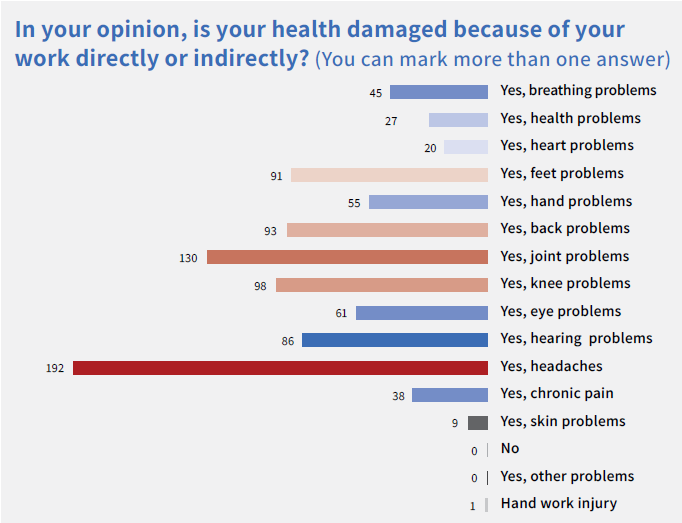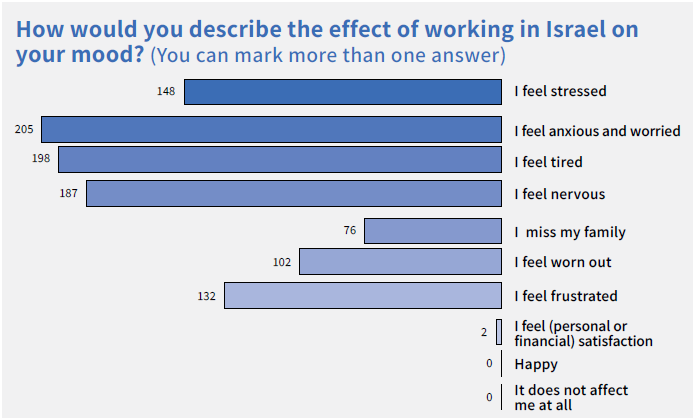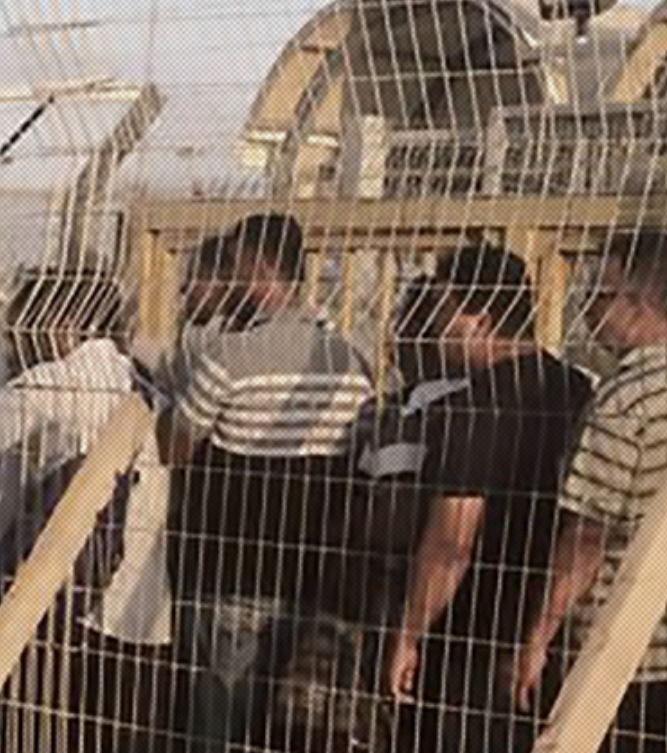Over 50 years of occupation have resulted in the Palestinian economy’s dependence on the Israeli economy, which has caused stress and hardship among Palestinian workers and created conditions that foster worker exploitation. Employment in Israel offers workers a higher income than they can attain in the West Bank (2.3 times higher). The need to support their families leads many who are educated to forgo finding work in their profession in the Palestinian Authority and instead look for employment in those sectors open to them in Israel, particularly the construction, agriculture, and industry sectors. In a recent survey we conducted with Palestinian workers in the construction sector, about half of the 256 respondents reported that they pay brokerage fees to obtain work permits. Of these, 81% reported that they pay between 2,000 and 3,000 NIS per month. The unequal power balance between Israel and the West Bank makes it impossible for many workers to consider other, less dangerous, employment options—until they get hurt at work.
As of June 2022, the Israeli permit quota for Palestinian workers stood at 80,000 in the construction sector. Palestinian workers employed in Israel not only support their nuclear family, but often their extended family too. Their income is also key for the overall economic stability of the West Bank as workers with permits bring in about NIS 41 million a day to the West Bank.
Palestinians working in Israel are entitled to compensation for a work injury or illness (whether due to an accident or to an occupational disease). In 2019, out of 115,725 West Bank Palestinians working in Israel (in all sectors), 1.1% (1,249 workers) had received injury compensation, compared to 1.7% of workers residents of Israel. However, the number of Palestinian workers who are injured at work is likely much higher. According to Israel’s National Insurance Institute (Bituach Leumi), accurate figures regarding Palestinian workers are probably lacking due to underreporting. Their assumption is that the level of safety is lower in other sectors and the actual harm to workers is higher.
Findings:
Findings from KLO surveys, interviews, and the focus group with workers point to a complex picture in which many Palestinian workers are only partially aware of the physical and mental health risk factors they face and are not aware of the possible specific consequences of these risks to their health.
Between May-June 2022 we conducted a survey among Palestinian construction workers entering Israel from the West Bank, conducted six semi-structured interviews with individual Palestinian workers, a focus group comprising six construction workers and interviewed five Israeli stakeholders and experts in the field of occupational health, including a former senior official in the Safety Administration, a senior occupational physician, an occupational psychologist, a representative of the Institute for Occupational Safety and Hygiene, and a construction site foreman.
Almost all (99.6%) of the 256 survey respondents described their work as dangerous. All respondents answered that their physical health has been directly or indirectly harmed by working in Israel and reported suffering from the following problems: headaches (75%); joint problems (50.8%);knee pain (38.3%); back problems (36.3%);leg problems (35.5%); eye problems (23.8%); hand problems (21.5%); breathing problems (17.6%); other health conditions (10.5%); chronic pain (14.8%); heart problems (7.8%); skin problems (3.5%).

The Israel Institute for Occupational Safety and Hygiene identifies five groups or categories of risk factors, four of which affect the physical health of construction workers, as outlined in the report:
- Chemical substances such as cement, silica, lime, glues, wood, paint and more. In the interviews, workers most frequently mentioned the difficulty they had working in dusty conditions and the effect of dust on their respiratory system, without identifying which dangerous substances were contained in the dust. For example, dust exposure was reported from plaster work, sawing and other tasks.
- Physical risk factors such as noise, vibration and UV and Infrared Radiation. Continuous noise, impact noise or high noise levels such as that caused by a demolition hammer may damage a worker’s hearing. An interviewee reported: “My hearing is weak because I work with the grinder. [..] I feel the deterioration in my hearing more now, it’s because of the work with grinders and demolition hammers.”
- Ergonomic risk factors such as repetitive motion, excessive muscle activation and pulling, awkward postures combined with vibration, or heavy lifting and prolonged bending. 100% of respondents reported suffering from orthopedic problems such as joint problems, knee pain, back problems, hand problems and more.
- Psychosocial risk factors. These include a variety of psychological, social, and family-related factors that affect a worker’s functioning and cause illnesses and other health problems. These factors influence a worker’s ability to deal with the demands of his family, community or even workplace, and they have short and long-term effects on a worker’s mental and physical health. Among these:
- Economic Dependence. Many workers report a work culture in which money coming in daily is the most important factor, not permanent, long-term employment and the accumulation of social rights. An interviewee reported he holds a bachelor’s degree in economics and business administration but prefers to work in Israel in construction. “There is work in my field [in the PA territories], but there is no money. […]. Salaries are not enough for [setting up] a house and supporting your family. The salary would not even be enough for my personal needs, let alone covering expenses for a house and a family. So, I cut the road short.”
- Brokerage Fees. Another stressor is the obligatory payment of high monthly brokerage fees to middlemen in order to secure employment in Israel. “I have an obligation—I pay about NIS 120 a day for my permit, [and] I have to pay for it whether I workor not. You have to go out [to work] no matter what your situation is. The man from whom I got the permit will not sympathize with me at the end of the month, he will tell me to bring the money – the payment for the permit. He won’t understand that I got sick or that I had a certain situation at home … He understands only one thing— he wants his money at the end of the month.”
- Treatment by Employers. We asked workers about bullying at work and, according to survey findings, 96% of the workers experienced at least one incident while working in Israel that affected their mental state and caused the following symptoms: 70.1%of the respondents reported insomnia, 35.8% reported breathing difficulties, 27.6% reported chest pressure, 12.2% reported rapid pulse rate, 39.8% reported other symptoms.
- Work Culture That Disregards Safety. Among survey respondents, 63.9% stated that safety procedures to protect their health at work are rarely followed in their workplaces (e.g., taking breaks, using protective gear, following restrictions on lifting heavy items, and having inspectors regularly on site to monitor safety), 33.3% answered that they do not follow safety rules at all. One interviewee said “…there are still many contractors […] who tell us to sand with our hands, which causes a lot of dust and that’s problematic [for our health].”
- Passing Through Checkpoints – The Long Road to Work. Workers reported high levels of stress at checkpoint crossings. The sight of thousands of workers standing together at the checkpoint causes “high blood pressure and the feeling that you are going to be squeezed due to overcrowding at the crossing.” Another said “I felt that my bones would break.”
- Long Hours on the Road and Prolonged Absences from Home. Almost all (98.4%) survey respondents said that it takes them between two to four hours to arrive at their workplace from the time they leave home. Many reported leaving for work at 3:00-3:30 am.
- Lack of sick days. This issue particularly affects workers who buy their work permits. Interviews showed that even if a worker is injured or does not feel well at work, he prefers to continue working for fear of losing payment for that day. According to the survey, 58.8% of respondents requested sick days but were not paid for them, compared to 17.6% who requested and received payment.
- Poor Access to Occupational Medicine Services in Israel and Barriers to Healthcare in the West Bank. A 2019 administrative circular extends occupational health services from the health maintenance organizations (Kupot Holim) to Palestinian workers, including tests to assess for loss of work capacity. The problem for Palestinian workers, which does not exist for Israeli workers, is that an employer may cancel a worker’s permit after a work accident, a prolonged illness, or a temporary loss of work capacity. Due to a lack of clarity in the regulations, some employers request a permit cancellation even when the worker has accrued sick days.

Recommendations:
- Hygiene and Awareness
- Cooperation with the Palestinian Ministry of Labor to promote occupational health.
- Extensive training at construction sites.
- Improve machinery and modernize construction sites.
- Improve checkpoint crossings and getting to work.
- Occupational Health Monitoring and Treatment
- Improve monitoring.
- Periodic medical examinations for construction workers paid for by employers.
- Issue clarifications to employers and workers about a worker’s right to use sick days and keep his permit.
- Reserve appointments with occupational physicians in Israel for Palestinian workers.
- Regional network of occupational physicians.
- Enforcement and Deterrence
- Use of existing sanctions.
- Allow complaints to be filed both anonymously and in person.
- Abolishing brokerage fees and guaranteeing the ability to change employers.
- Establishment of an Occupational Safety and Health National Authority.


